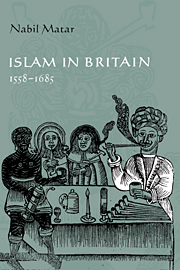Book contents
- Frontmatter
- Contents
- Acknowledgments
- Transcription
- Introduction: Islam in early modern Britain
- 1 “Turning Turke”: conversion to Islam in English writings
- 2 The renegade on stage and in church
- 3 “Arabia Britannica”: “Alcoran” and the legacy of Arabic Islam
- 4 “Baptizing the Turk”: conversion to Christianity in English writings
- 5 Eschatology and the Saracens
- Conclusion: Islam and Britain: centripetal to centrifugal
- Bibliography
- Index
3 - “Arabia Britannica”: “Alcoran” and the legacy of Arabic Islam
Published online by Cambridge University Press: 27 October 2009
- Frontmatter
- Contents
- Acknowledgments
- Transcription
- Introduction: Islam in early modern Britain
- 1 “Turning Turke”: conversion to Islam in English writings
- 2 The renegade on stage and in church
- 3 “Arabia Britannica”: “Alcoran” and the legacy of Arabic Islam
- 4 “Baptizing the Turk”: conversion to Christianity in English writings
- 5 Eschatology and the Saracens
- Conclusion: Islam and Britain: centripetal to centrifugal
- Bibliography
- Index
Summary
Nova Faelix Arabia. Vnder that shape of Arabia, this Iland [Britain] being figugured [sic] … The most worthy personage aduaunced in this place, was Arabia Britannica.
Through the writings of dramatists, travelers, and chroniclers, along with the accounts of returning captives and reconverted “renegades,” knowledge of Islam reached a cross-section of English society. By the middle of the seventeenth century, Islam was no longer viewed as a religion with which Christians were engaged in distant lands but as an intellectual and social matter at home. In May 1649, and for the first time in English history, the complete text of the Qur'an was translated into English by Alexander Ross (1592–1654): The Alcoran of Mahomet, Translated out of Arabique into French; By the Sieur Du Ryer, Lord of Malezair, and Resident for the King of France, at Alexandria. Although the translation was poor, a text purporting to be the Qur'anic revelation was now available to English readers and would remain the only English version for the next eighty-five years – until the translation by George Sale in 1734.
Ross's translation demonstrates the ongoing interest in Islam in seventeenth- century England. At the end of the medieval period, England had lagged behind the rest of Europe in Arabic and specifically Qur'anic studies. But at the beginning of the seventeenth century, the English Arabist William Bedwell (1563–1632) wrote the first book to be published in England consisting of a list of the suras of the Qur'an: Index Assvratarvm Mvhammedici Alkorani, That is, A Catalogue of the Chapters of the Turkish Alkoran, as they are named in the Arabicke, and known to the Musslemans … Gathered and digested according to their naturall order, for…
- Type
- Chapter
- Information
- Islam in Britain, 1558–1685 , pp. 73 - 119Publisher: Cambridge University PressPrint publication year: 1998



